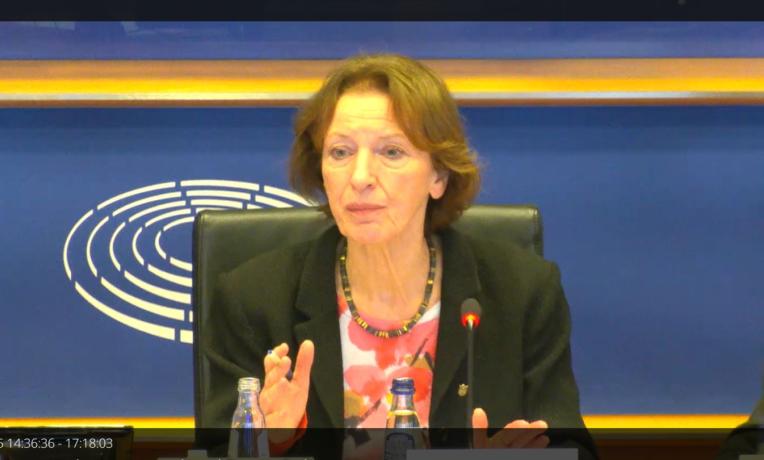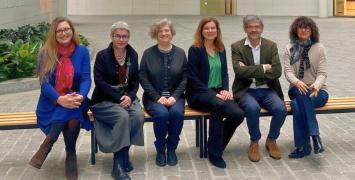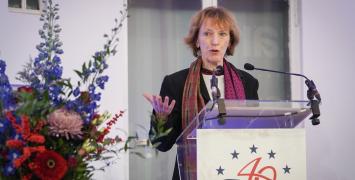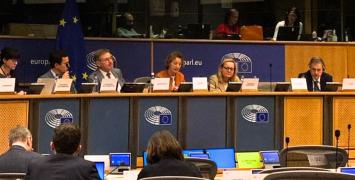ERC President’s speech to the European Parliament's ITRE Committee

-- Check against delivery --
Dear Chair of the ITRE committee,
Dear Members of the ITRE committee,
Dear Ladies and Gentlemen,
I would first like to thank Borys Budka, Chairman of the ITRE Committee for the invitation to speak here today and to exchange views with you on the ERC. Last time I spoke to this Committee was in November 2022 during the previous term, and so I am happy to be back with you in this new cycle.
I welcome today’s adoption of the report (on the implementation of Horizon Europe in view of its interim evaluation and recommendations for the 10th Research Framework Programme). We are very happy about your support of a higher budget research, which will be very important.
In times of crisis, it is easy to lose sight of the long term. Yet, even as we respond to immediate challenges, we must continue to lay the foundations for the future. History shows that investing in frontier research is vital to securing long-term prosperity.
This discussion comes at a crucial moment. With decisions on the next Multiannual Financial Framework expected before the summer, we have an opportunity to shape Europe's future. This time, the stakes are even higher —our response must match the scale of the challenge.
The warning signs have been clear for years. As Mario Draghi has pointed out, we are falling behind in advanced technologies while remaining anchored in industries of the past - which are important, but they are not our future. Without urgent action to boost productivity and innovation, Europe risks being left behind.
The AI race exemplifies this challenge. While Europe has world-class researchers, many of whom have contributed to the development of AI, we lack the conditions for scale-up and growth. The U.S. and China dominate not just in AI research but in a range of other critical technologies. Europe cannot afford to be just a consumer of these technologies and to rely on others for crucial components of our economy.
AI also reminds us of something fundamental - scientific progress is unpredictable, non-linear, and often disruptive. The recent achievements of certain US and Chinese tech companies in this field are impressive, but artificial intelligence was founded as an academic discipline in 1956. So AI was certainly not invented with Chat GPT! The foundation for it is old and it was supported through public funding.
It was researchers, predominantly working in public sector universities and laboratories, who developed many of the ideas and techniques that are now being used on such a massive scale by the big tech companies. This shows that the real breakthroughs come from long-term investment in curiosity-driven research—exactly the kind of work supported by the ERC.
But science does not stand still. The pace of innovation is accelerating, with China now a major scientific power. If we want to achieve our ambitions and secure our autonomy, Europe must lead, not lag. It is not enough to adopt or apply technologies developed elsewhere—we need to be at the cutting edge.
Recent events have further highlighted our vulnerabilities. The global innovation landscape is shifting, and the policies of the current U.S. administration could alter funding flows, regulations, and partnerships in very unpredictable ways. Europe must be prepared to act independently and decisively. This means committing to research and innovation at both EU and national levels. We must ensure the right balance between supporting immediate economic needs and securing long-term scientific leadership.
The ERC Scientific Council strongly supports an ambitious, long-term vision for European competitiveness. We welcome the European Commission’s commitment to putting research and innovation at the heart of Europe’s economy. The political guidelines by President von der Leyen were music in our ears. But words must now be matched by action.
My message today is simple: an independent ERC, with a doubled budget in the next Multiannual Financial Framework, is a strategic investment. It will help Europe reclaim its leadership in science and technology and compete with the U.S. and China.
Since its creation in 2007, the ERC has proven its worth. The Draghi Report put it plainly: “The ERC has become essential to the competitiveness of European science. Its sound reputation is built on a focus on excellence, independent decision-making and a rigorous, impartial evaluation system. The ERC is a key reason why several countries around the world want to join the Horizon Europe programme as associates. Currently, the ERC is not fully realising its potential, as it reaches too few researchers.”
The ERC succeeds because it is different. Its simple, tailored procedures allow Europe’s best researchers to thrive. Standardized, bureaucratic processes designed for other programmes should not be imposed on the ERC.
Of course, funding the ERC alone is not enough. If Europe is to be truly competitive, we must go beyond research excellence. We need policies that support disruptive innovation, help scale breakthrough ideas, and ensure the right market conditions. None of these steps alone is sufficient—but reinforcing successful instruments like the ERC is an essential first step. This Parliament has long championed frontier research and the ERC. I urge you to continue that fight.
In closing, I ask us all to take the long view. Europe cannot afford to be a follower in the global knowledge economy. If we lead in research, we shape our own future. Let’s seize this moment to build a Europe where science and innovation drive our prosperity and independence.





